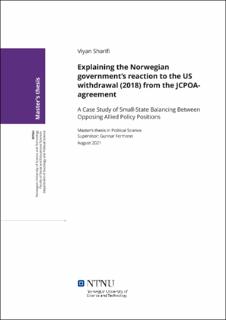| dc.contributor.advisor | Fermann, Gunnar | |
| dc.contributor.author | Sharifi, Viyan | |
| dc.date.accessioned | 2021-09-28T17:35:55Z | |
| dc.date.available | 2021-09-28T17:35:55Z | |
| dc.date.issued | 2021 | |
| dc.identifier | no.ntnu:inspera:80180200:36963958 | |
| dc.identifier.uri | https://hdl.handle.net/11250/2784623 | |
| dc.description.abstract | I denne masteroppgaven er jeg opptatt av å studere hvordan små stater som Norge balanserer mellom to store sikkerhets- og handelspartnere, som har motstridende standpunkter om fremtiden til de multilaterale ordningene som JCPOA. Oppgaven presenterer to problemstillinger: (i) Hva var den Norske reaksjonen på USAs tilbaketrekning fra JCPOA-avtalen (2018)? Og, (ii) Klemt mellom de motstridende posisjonene til EU og USA, hvordan kan den (utviklende) norske politikkposisjonen (e) forklares?
Ved å bruke rammeverket for utenrikspolitisk analyse (FPA) som utgangspunkt, utledes et utvalg av utenrikspolitiske relevante teorier, som er fordelt på to nivåer (i) global politikk og (ii) det innenlandske samfunnet og brukes til å teoretisere X1-4 antall hypoteser. Hypotesene forutsetter om den norske reaksjonen på USAs tilbaketrekning fra JCPOA (2018) (Y) ble motivert av: (H1) ønsket om å prioritere egne sikkerhetsinteresser og forholdet til USA, (H2) ønsket om å optimalisere balansen mellom norske sikkerhets- og økonomiske interesser slik det er uttrykt i forholdet til USA og EU, (H3) ønsket om å bekrefte småstaten Norges utenrikspolitiske investeringer i multilaterale samarbeid og multilaterale institusjoner, og (H4) ønsket om å ivareta de kommersielle interessene til norsk næringsliv. Videre brukes hypotesene som utgangspunkt for den empiriske kartleggingen, og til å empirisk teste hvilke forhold som kan best forklare den norske regjeringens adferd på USAs tilbaketrekking fra atomavtalen 2018.
Ut ifra den empiriske analysen ble det i uttalelse og handling avslørt at den norske regjeringen ønsket å fortsette atomavtalen med Iran. De empiriske funnene fra de partielle analysene viser til en kombinasjon av innside-ut og utside-inn forklaringer som muliggjorde og motiverte den norske reaksjonen. Norges respekt for den multilaterale ordningen i utenrikspolitikk og norske næringsinteresser, i tillegg viste analysen til en forklaring som vi ikke hadde teoretisert, nemlig Norges tilknytning og handelsavhengighet av EU. Studien avsluttes med å konkludere at den Norske regjeringens ønske om å fortsette sin støtte til JCPOA i lys av USAs tilbaketrekking, sannsynligvis ble styrket av forklaringene som omhandler den norske respekten for internasjonale avtaler og støtte til multilaterale ordninger, og deres økonomiske og kommersielle (handels) interesser. | |
| dc.description.abstract | This thesis explores how small states like Norway balances between two major security- and trade partners, that are taking conflictual stands on the future of the multilateral arrangements such as the JCPOA. More precisely, it asks two questions: (i) What is the Norwegian position towards Iran, on the issue of The Joint Compre¬hensive Plan of Action, after the US withdrawal from the multilateral nuclear deal with Iran? And (ii) Squeezed between the conflicting positions of the EU and the US, how can the (evolving) Norwegian policy position(s) be explained?
By utilizing the framework of Foreign Policy Analysis (FPA) as a point of departure, a selection of foreign policy-relevant theories, located at the two levels of (i) global politics and (ii) domestic society, are deduced, and applied to argue X1-4 number of hypotheses. The hypotheses presupposes if the Norwegian reaction to the US withdrawal from the JCPOA (2018) (Y) was motivated by: (H1) the desire to prioritize own security interests and the relationship to the United States, (H2) the desire to optimize the balance between Norwegian security- and economic interests as embodied in the relationships with the United States and the EU, (H3) by the desire to confirm small state Norway’s foreign policy investments in multilateral cooperation and multilateral institutions, and (H4) by the desire to safeguard the commercial interests of Norwegian business. The hypotheses are used as vantage points for the empirical mapping and testing of explanations as to why and how the Norwegian government reacted to the US withdrawal from the 2018 Nuclear deal.
The empirical analysis revealed in political statements and material action that the Norwegian government desired to keep the deal alive. Our explanatory findings confirms that a combination of inside-out and outside-in factors enabled and motivated the Norwegian policy reaction to the US withdrawal decision. A political culture of multilateralism in foreign policy and business interests, and a final finding that was not preconceived in any theoretical argued hypothesis, which relates to Norway’s trade dependence on the EU and the related domestic export business interests. The study concludes that the Norwegian government’s resolve to stick to her support of the JCPOA in the face of a US withdrawal from the agreement with Iran was likely strengthened by the Norwegian respect for international agreements and support for multilateral arrangements, and their economic- and commercial (trade) interests. | |
| dc.language | eng | |
| dc.publisher | NTNU | |
| dc.title | Explaining the Norwegian government’s reaction to the US withdrawal (2018) from the JCPOA- agreement. A Case Study of Small-state Balancing Between Opposing Allied Policy Positions. | |
| dc.type | Master thesis | |
